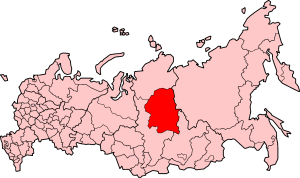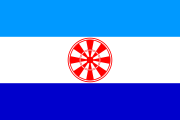
Evenk Autonomous Okrug
Encyclopedia


Federal subjects of Russia
Russia is a federation which, since March 1, 2008, consists of 83 federal subjects . In 1993, when the Constitution was adopted, there were 89 federal subjects listed...
of Russia
Russia
Russia or , officially known as both Russia and the Russian Federation , is a country in northern Eurasia. It is a federal semi-presidential republic, comprising 83 federal subjects...
(an autonomous okrug
Autonomous okrug
Autonomous okrug is a term for an administrative country subdivision in Russia. The term was also used in the Soviet Union.- See also :* Okrug* Autonomous okrugs of Russia* Autonomous okrugs of the Soviet Union...
of Krasnoyarsk Krai
Krasnoyarsk Krai
Krasnoyarsk Krai is a federal subject of Russia . It is the second largest federal subject after the Sakha Republic, and Russia's largest krai, occupying an area of , which is 13% of the country's total territory. The administrative center of the krai is the city of Krasnoyarsk...
). It had been created in 1930. Its administrative center was the urban-type settlement
Urban-type settlement
Urban-type settlement ; , selyshche mis'koho typu ) is an official designation for a type of locality used in some of the countries of the former Soviet Union...
of Tura. As of 2006, at 767,600 km², it was Russia's seventh largest federal subject, and the country's least populous:
In 1999, the governor of Krasnoyarsk, General Alexander Lebed, demanded the okrug recognize the central district government of Krasnoyarsk had authority over it, which the okrug refused to do, causing a power struggle between the central district and the okrug's government.
Following a referendum on the issue held on April 17, 2005, Evenk and Taymyr Autonomous Okrug
Taymyr Autonomous Okrug
Taymyr Dolgano-Nenets Autonomous Okrug , or Taymyria, was a federal subject of Russia , the northernmost in mainland Russia . It is named after the Taymyr Peninsula...
s were merged into Krasnoyarsk Krai
Krasnoyarsk Krai
Krasnoyarsk Krai is a federal subject of Russia . It is the second largest federal subject after the Sakha Republic, and Russia's largest krai, occupying an area of , which is 13% of the country's total territory. The administrative center of the krai is the city of Krasnoyarsk...
effective January 1, 2007 (some Evenks contested the results, however). Administratively, they are now considered to be districts
Raion
A raion is a type of administrative unit of several post-Soviet countries. The term, which is from French rayon 'honeycomb, department,' describes both a type of a subnational entity and a division of a city, and is commonly translated in English as "district"...
with special status within Krasnoyarsk Krai; municipally, they have a status of municipal districts (see Evenkiysky District).
Boris Zolotaryov was the last governor of the autonomous okrug.
Demographics
Population (2002): 17,697.Ethnic groups:
Of the 17,697 residents (as of the 2002 Census) 2 (0.01%) chose not to specify their ethnic background. Of the rest, residents identified themselves as belonging to 67 ethnic groups, including ethnic Russians (62%), Evenks
Evenks
The Evenks are a Tungusic people of Northern Asia. In Russia, the Evenks are recognized as one of the Indigenous peoples of the Russian North, with a population of 35,527...
(21.5%), Yakuts
Yakuts
Yakuts , are a Turkic people associated with the Sakha Republic.The Yakut or Sakha language belongs to the Northern branch of the Turkic family of languages....
(5.6%), Ukrainians (3.1%), Kets (1.2%), 162 Tatars
Tatars
Tatars are a Turkic speaking ethnic group , numbering roughly 7 million.The majority of Tatars live in the Russian Federation, with a population of around 5.5 million, about 2 million of which in the republic of Tatarstan.Significant minority populations are found in Uzbekistan, Kazakhstan,...
(0.9%), 152 Khakas
Khakas
The Khakas, or Khakass , are a Turkic-speaking people, who live in Russia, in the republic of Khakassia in southern Siberia. They speak the Khakas language.The origin of the Khakas people is disputed...
(0.9%) and 127 Volga German
Volga German
The Volga Germans were ethnic Germans living along the River Volga in the region of southern European Russia around Saratov and to the south. Recruited as immigrants to Russia in the 18th century, they were allowed to maintain German culture, language, traditions and churches: Lutherans, Reformed,...
s (0.7%).
| census 1939 | census 1959 | census 1970 | census 1979 | census 1989 | census 2002 | |
|---|---|---|---|---|---|---|
| Evenks Evenks The Evenks are a Tungusic people of Northern Asia. In Russia, the Evenks are recognized as one of the Indigenous peoples of the Russian North, with a population of 35,527... |
3,721 (39.3%) | 3,474 (33.7%) | 3,207 (25.3%) | 3,239 (20.3%) | 3,480 (14.0%) | 3,802 (21.5%) |
| Yakuts Yakuts Yakuts , are a Turkic people associated with the Sakha Republic.The Yakut or Sakha language belongs to the Northern branch of the Turkic family of languages.... |
713 (7.5%) | 51 (0.5%) | 781 (6.2%) | 822 (5.1%) | 937 (3.8%) | 991 (5.6%) |
| Kets | 14 (0.1%) | 142 (1.1%) | 154 (1.0%) | 150 (0.6%) | 211 (1.2%) | |
| Russians Russians The Russian people are an East Slavic ethnic group native to Russia, speaking the Russian language and primarily living in Russia and neighboring countries.... |
4,675 (49.4%) | 5,975 (57.9%) | 7,732 (61.1%) | 10,400 (65.1%) | 16,718 (67.5%) | 10,958 (61.9%) |
| Ukrainians Ukrainians Ukrainians are an East Slavic ethnic group native to Ukraine, which is the sixth-largest nation in Europe. The Constitution of Ukraine applies the term 'Ukrainians' to all its citizens... |
117 (1.2%) | 196 (1.9%) | 254 (2.0%) | 472 (3.0%) | 1,303 (5.3%) | 550 (3.1%) |
| Others | 234 (2.5%) | 610 (5.9%) | 542 (4.3%) | 881 (5.5%) | 2,181 (8.8%) | 1,185 (6.7%) |
Vital statistics (2005)
- Births: 283 (birth rate 16.3)
- Deaths: 259 (death rate 14.9)

